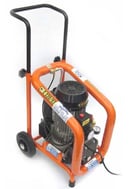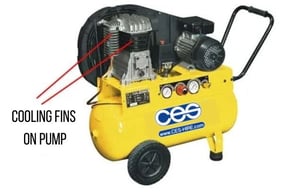Portable Air Compressors
Best Practice Tips For Using a Portable Air Compressor
Air Compressors are more common than you would think and most industries will use a compressor of some sort to power elements integral to their business. Check out CES’s top tips for using an air compressor from machine selection to safety tips as well as key information when operating your machine.
Tips for Machine Selection
Before you select a portable air compressor to use for your job, consider the purpose of your compressor in regards to the tools/machines you’ll use it for. Small machines that may be used in short bursts will only require a small tank of pressurised air. However, if you require your tools/machine to work continuously for lengthy periods, you’ll need a larger compressor with a tank capacity that can cope with replenishing the pressurised air as you use it so that you are not in a start-stop situation.

Safety Tips
Safety is incredibly important when it comes to working with compressed air. Releasing pressurised air suddenly through a puncture, releasing valves too quickly or removing hoses whilst still pressurised is dangerous and can cause an explosion so it is essential to follow safety tips and always wear the correct PPE. To avoid dangerous situations, ensure you de-pressurise hoses and tools before you connect and disconnect. Also make sure that you match the pressure of the compressor to the tool’s capability (the compressor pressure can be adjusted accordingly via a valve). Exceeding the stated pressure will damage the tool/machine and the compressor. Finally, NEVER plug your compressor into an extension cable; this is likely to cause overheating and the potential for fires.
Tips For Pre-Use Checks
We would encourage you to perform some key pre-use checks each time you use your compressor which will improve the efficiency and longevity of your machine. These checks include:
-Checking the cooling system ensuring the cooling fins are free from dust and debris
-Cleaning/replacing the air intake filter
-Draining off condensation/moisture that collects in the tank
-Examining the hoses and airlines for wear and cracks which cause air to leak.
-Checking the cooling/engine oil to make sure the engine is fully protected and lubricated
-Inspecting the drive belt for deterioration or stretching that could cause the machine to slip.
For more detailed information regarding these checks take a look at our safety and maintenance blog. Also don’t forget to book in regular services for your machine to keep it in tip top condition which is a service that CES offer.

Tips for Machine Operation
Make sure your machine sits on a flat surface with optimum air flow to allow affective compressing as well as better cooling. It is also key to unravel your hoses properly to allow proper air flow, making sure there are no kinks that restrict the air travelling to the tool/machine. When it comes to attaching your hoses, make sure any locking collars are clicks over the male connector to ensure a secure connection. Finally make sure you have closed any pressure release valves and drains before starting up the compressor.
Once you have finished using your machine keep your machine neat and tidy by disconnecting all the parts, winding up hoses and storing everything in a protected area. Before packing away always switch off the machine at the mains and turn off the regulator valve to prevent any more air travelling into the hose. Run your connected tool/machine empty of the stored compressed air. Drain the pressurised air from the tank via the pressure release valve. This should be done slowly, gradually twisting until you hear a gentle hiss; any sudden release of pressurised air can be dangerous. For more detailed information regarding operations, take a look at our blog on How to Operate your Portable Air Compressor.
Compressors at CES
CES offer a range of portable air compressors to suit all machine sizes, budgets and machine applications. Take a look at our selection to hire or purchase. We will happily recommend a compatible compressor for you machine so why not give us a call (01494 715472) and pick our brains.



